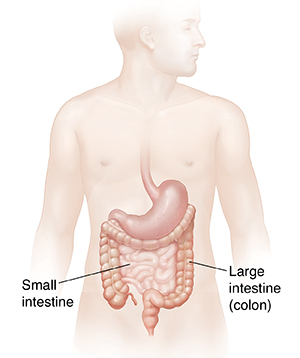A
B
C
D
E
F
G
H
I
J
K
L
M
N
O
P
Q
R
S
T
U
V
W
X
Y
Z
Click a letter to see a list of medical procedures beginning with that letter.
Click 'Back to Intro' to return to the beginning of this section.
Understanding Intestinal Obstruction
The small and large intestines are long tubes in the belly that play a big part in digesting food. An intestinal obstruction is when the small or large intestine is blocked at one or more spots. This prevents air, food, stool, and fluid from passing normally through the digestive system. It's also called a bowel obstruction or blockage.

What causes intestinal obstruction?
Intestinal obstruction can be caused by:
-
Scar tissue inside the belly. Scar tissue can form after surgery or after some intestinal infections. It can press on the intestine.
-
A hole or split in the belly wall (hernia). If you have a hernia, part of your intestine may slip through the belly wall and get pinched. Then food and fluid can’t flow through as usual.
-
Tumors. These can grow inside or outside the intestines. Tumors can block the intestines from the inside. Or they can press on them from the outside.
-
Twisting of the intestine (volvulus). The intestine can sometimes twist around on itself. This can cause a blockage.
-
Crohn's disease, which is an inflammatory disease.
-
Postoperative ileus. This is when your bowel stops working the right away after you have abdominal surgery. It may also occur after you have other types of surgery. Anesthesia and surgery temporarily slow down intestinal movement. An ileus after surgery often goes away on its own. But it may need to be treated if it lasts longer than expected.
Symptoms of intestinal obstruction
Symptoms of intestinal obstruction can vary. It depends on where the blockage is and if the intestine is partly or fully blocked. Symptoms may include:
-
Belly pain or cramping. This may be constant or come and go.
-
A feeling of fullness or bloating
-
Upset stomach (nausea) or vomiting
-
Diarrhea
-
Constipation
-
Loss of fluid (dehydration)
-
Inability to pass gas or stool
-
Fever or sweating
-
Discomfort and bloating after meals
Treatment for intestinal obstruction
Treatment depends on where the blockage is and if the intestine is partly or fully blocked. It also depends on what is causing the blockage. Most cases of small intestinal obstruction will go away after a few days. If you need treatment, it may include:
-
Removing the contents of the digestive tract above the blockage. This is done through a tube that's inserted through your nose and goes down into your stomach.
-
Giving fluids through an IV (intravenous) line placed in your arm or hand. This replaces fluids lost with vomiting or diarrhea. It may also be used to give you medicine, if needed.
-
Having surgery. For a serious intestinal obstruction, you often will need surgery to remove the blockage and fix any damage.
-
Placing a tube (stent) to keep an area of the large intestine (colon) open if a tumor is blockingit. This can be done during a colonoscopy.
Possible complications of intestinal obstruction
Intestinal obstructions can have serious complications, such as:
-
Blood flow to the intestine may be blocked. This can cause intestinal tissue to die.
-
Leakage of intestine contents into the belly
-
Irritation or infection in the belly cavity
-
Death
When to call your healthcare provider
Call your provider right away if you have any of these:
-
A new lump or bulge in the skin on your belly or groin
-
Vomiting that won’t stop
-
Inability to pass gas or stool
-
Swollen belly or increasing belly pain
-
Weakness, dizziness, or fainting
-
Abnormal drowsiness or confusion
-
Reduced urine output or extreme thirst
-
Fever of 100.4°F (38°C) or higher, or as directed by your provider
-
Chills
-
Pain that gets worse
-
Symptoms that don’t get better with treatment, or symptoms that get worse
-
New symptoms
Online Medical Reviewer:
Jen Lehrer MD
Online Medical Reviewer:
L Renee Watson MSN RN
Online Medical Reviewer:
Rita Sather RN
Date Last Reviewed:
5/1/2022
© 2000-2024 The StayWell Company, LLC. All rights reserved. This information is not intended as a substitute for professional medical care. Always follow your healthcare professional's instructions.